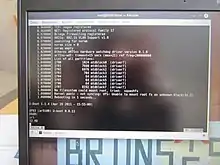Bootloop
A bootloop (also named boot loop or boot-loop) is a problem that occurs on computing devices which are unable to complete the regular booting sequence and reboot before it is finished.
Examples
- Windows NT 4.0[1]
- Windows 2000[2]
- Windows Server[3]
- Windows 10[4]
- The Nexus 5X[5]
- Android 10: when setting a specific image as wallpaper, the luminance value exceeded the maximum of 255 which happened due to a rounding error during conversion from sRGB to RGB. This then crashed the SystemUI component on every boot.[6][7]
- Google Nest hub[8]
References
- Ruley, John D.; David Methvin; Tom Henderson; Martin Heller (1997). Networking Windows NT 4.0: Workstation and Server. Wiley. p. 257. ISBN 9780471175025 – via Google Books.
- Shultz, Gregory (February 2001). "Disabling automatic reboot prevents possible reboot loop". Windows Professional. Element K Journals. 6 (2): 9. ProQuest 191083238 – via ProQuest.
- "New Windows Server updates cause DC boot loops, break Hyper-V". BleepingComputer. Retrieved 2022-05-17.
- Paul Wagenseil (2021-01-21). "Windows 10 update sending PCs into endless boot cycle: What to do". Tom's Guide. Retrieved 2022-05-20.
- Hollister, Sean (2021-10-19). "Google has tried everything but building the best phone". The Verge. Retrieved 2022-05-17.
- "'It was unintentional,' says creator of 'cursed' Android wallpaper". The Week. Retrieved 2022-05-19.
- Hager, Ryne (2020-06-01). "Google thinks it has solved the mystery of the cursed bootlooping wallpaper". Android Police. Retrieved 2022-05-19.
- Peckham, James (2022-03-29). "Google Nest Hub gets a new UI that's so fresh it could bootloop your smart display". Android Police. Retrieved 2022-05-19.
This article is issued from Wikipedia. The text is licensed under Creative Commons - Attribution - Sharealike. Additional terms may apply for the media files.
